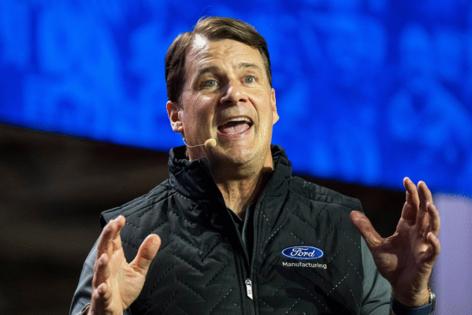Ford CEO calls for skilled trades investments as China export rules cause plant shutdowns
Published in Business News
Ford Motor Co. CEO Jim Farley called on U.S. companies to invest in skilled trades, manufacturing and other "essential economy" jobs in an effort to boost productivity and reduce reliance on China, as the Dearborn, Michigan, automaker has idled plants because of challenges in obtaining rare-earth materials from the Asian nation.
Ford will host a Ford Pro Accelerate summit this fall at Ford's Michigan Central Station in Detroit on how to strengthen construction, service and maintenance, agriculture, energy and skilled trades industries. Ford spokesperson Dan Barbossa said the event is expected to be held at the end of September. It will gather business, government and technology leaders to address the shortage of workers in these industries and obstacles to growth in these sectors — many of whose businesses rely on Ford commercial vehicles.
"People do not realize how dependent we are as a country on making things in other countries. We cannot get any high power magnets without China," Farley said last Friday at the Aspen Ideas Festival. "We shut down plants for the last three weeks, because you cannot get high-power magnets going into speaker audio systems, your seat motors, your wiper motors, your door holders. And we can't make that."
Ford declined to specify the affected plants, though Farley's characterization conveys multiple affected plants, not a single plant being down for three weeks. Spokesperson Lars Weborg said the company is encouraged by progress being made on the matter with China and is working with the Trump administration on the subject.
U.S. Treasury Secretary Scott Bessent said last week that a trade deal had been reached with China that would speed exports of rare earth minerals and magnets to the United States.
Rare earths describe 17 metallic elements with properties crucial for advanced technologies that are not uncommon, but often are found in places difficult to mine. China effectively has had a monopoly on global heavy rare-earth elements processing and has major shares of processing for other rare earths. Retaliating against tariffs imposed by the Trump administration, China instituted new export restrictions and licensing requirements on certain rare-earth minerals, which has resulted in severe consequences for the automotive industry.
"It's not a pain point in terms of, we're losing a lot of production, but it's hand-to-mouth, hand-to-mouth," Lisa Drake, vice president of technology platform programs and EV Systems, said earlier this week at the company's under-construction battery plant in south-central Michigan's Marshall. "It's a normal supply chain scrambling that you have to do. It's been getting better, and we've been able to move things around with production. Would we prefer not to do it? Yes. Are we in a better position than we thought we are? Yes, we've been able to manage it quite well, but it will be great when it gets resolved."
The battery plant itself in Marshall also is reliant on Chinese technology. Ford is licensing product design and manufacturing process intellectual property from Chinese battery maker Contemporary Amperex Technology Co. Ltd. to produce lithium-iron-phosphate batteries at the plant starting next year instead of sourcing them from China like competitors Tesla Inc. and General Motors Co. have or plan to do.
Licensing the technology from China, however, has led to criticism from Republican lawmakers, and a provision in the U.S. House of Representatives "One Big, Beautiful Bill" budget proposal would eliminate the ability to obtain production tax credits granted by the Inflation Reduction that President Joe Biden signed in 2022. That could slow the hiring and production at the plant, Drake said this week, after Ford Executive Chairman last month said the plant could be in peril. The company, however, says a Senate proposal is more workable.
"We just need to be more humble as a country, that they (China) do things really well, that we need to learn," Farley said. "And how we learn is through joint ventures and cooperations and partnerships. But we can't be so obsessed with 'China's the enemy' that we aren't humble enough to set up those business structures and then have people in those companies, in those JVs that transfer the knowledge and the know-how back to the home company, Ford."
The Chinese reliance, Farley said, underscores the importance of domestic manufacturing and the essential economy that he described as "everything that gets built or moved or fixed." It represents $12 trillion of economic activity in the United States and represents almost 100 million jobs, according to a report from the Aspen Institute, a nonprofit focused on finding solutions for societal challenges, and Ford.
"It's really the backbone of our society," Farley said.
White-collar productivity since 2017 has improved 28%, while that of the essential economy sectors has declined nearly 2%, according to the report. With technologies like artificial intelligence demanding more workers in energy, welding and heating, and ventilation and air-conditioning, the need for people to fill these roles increases.
"On a personal level, a cracked bridge or a blown transformer or an understaffed construction site, they have a huge impact on our daily lives," Farley said, "and with so few filled jobs, this is going to be painfully expensive to fix when it all falls apart."
In a LinkedIn post, Farley called for speeding up permitting processes, increasing spending on vocational training, leveraging robotics and augmented reality to help with these spaces and suggested an AmeriCorps-type program for these roles. He pointed to Germany's apprenticeship program that exposes students as young as junior high school to enter the workforce for these jobs.
"Companies like Ford, other companies, academics or governments have to get really serious about investing in trade schools and skilled trades," Farley said, adding that if the company wants to manufacture, "we better treat it with the respect it deserves. We haven't."
©2025 www.detroitnews.com. Visit at detroitnews.com. Distributed by Tribune Content Agency, LLC.












Comments